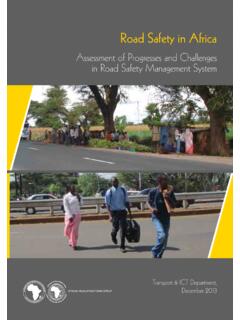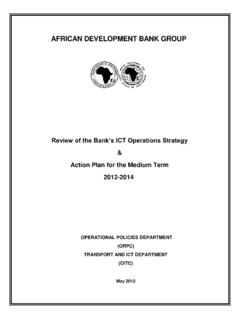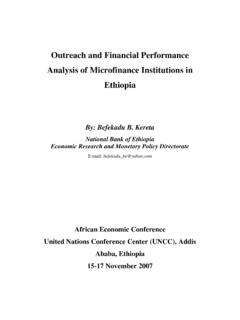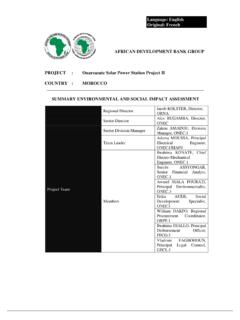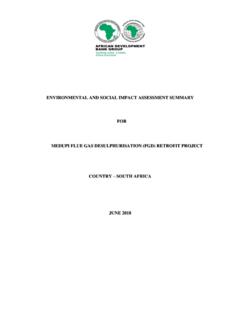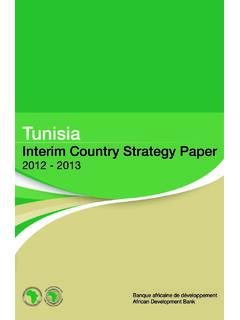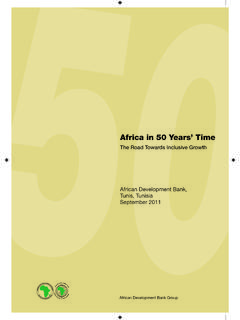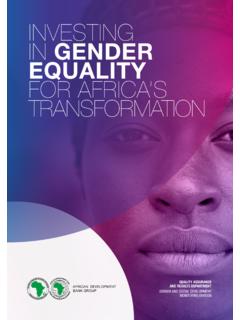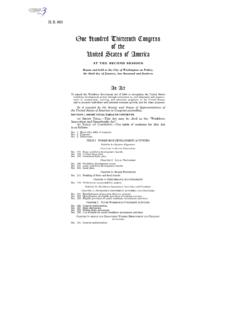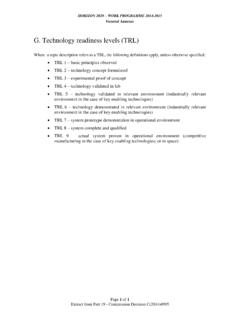Transcription of Youth in Agribusiness within an African Agricultural ...
1 BACKGROUND PAPER. Youth in Agribusiness within an African Agricultural Transformation Agenda Youth in Agribusiness Prepared by: Nteranya Sanginga , IITA. Co-Conveners Ken Lohento ,CTA. Dayina Mayenga, ILO. 0. Executive Summary Africa has the youngest population in the world and each year 10-12 million of its young people seek to enter the continent's workforce, too many without success. This highlights the great challenge of Youth unemployment but can also be seen as an opportunity for them to become the engine driving new agriculture and Agribusiness enterprises as well as rural transformation. But Youth face many hurdles in trying to earn a livelihood from agriculture and Agribusiness . Pressure on arable land is high making it difficult to start new farms by the Youth interested in primary Agricultural commodity production. Youth lack access to credit, improved technologies, practical skills and fair markets necessary as well as other logistics and services for Agribusiness success.
2 Ironically, educational services have expanded considerably in Africa without due consideration of the quality of education offered, or the skills match with employment opportunities in rural areas. This has resulted in the paradox whereby a large number of graduates ill equipped to be absorbed into employment upon graduation co-exists with several unfilled vacancies and business opportunities in small- and medium-scale enterprises. Even with opportunities opening, most educated Youth find imagined futures in farming difficult. Agriculture is labor-intensive, with difficult working conditions and high risks. Productivity gaps and market inefficiencies are also widespread. Nonetheless, Agribusiness can be profitable for Youth with the right skills. Rural enterprise is being advanced along Agricultural commodity value chains within the context of professionalized agriculture.
3 As a result, training projects increasingly link Youth with access to Agricultural resources. In this way, the quality of training along Agricultural value chains, terms of credit and the Agricultural technologies, commodities and markets being advanced have a huge influence upon both the livelihoods of Youth and the process of Agricultural transformation. Clearly opportunity exists for directing African Youth toward Agribusiness , and if done in an inclusive manner, to profound societal and economic benefit. Many mechanisms toward this goal are being examined by several research, development and investment interests. The next critical step is to develop a comprehensive program that forges widespread commitment and partnership, combining these approaches in an effective manner and delivering cost -effective opportunities to Youth for profitable Agribusiness development. This effort must extend well beyond reorientation within formal training settings, rather it must involve the development of detailed agri-business plans and creditworthy loan applications, leading to the establishment of efficient and effective networks of new agri-business ventures and services across the entire Agricultural value chain.
4 It must be built upon commitment at the national levels, close collaboration among and with regional development partners to support an enabling environment, and requires investment by the private sector and financial institutions. Equally important, the program must be attractive to Youth , able to challenge counterproductive mindsets through building self-confidence, and local efforts must be led and owned by Youth themselves. Overall, the interest of the Youth must be aroused and kept sustainably. The Youth in Agribusiness Program is about entrepreneurship development among the Youth , including women. It will be implemented by dedicated national agencies with execution by specialized technical centers of excellence such as the International Institute of Tropical Agriculture (IITA), The Alliance for a Green Revolution in Africa (AGRA), The Forum for Agricultural Research in Africa (FARA), The Technology Center for Agriculture and Rural i Youth in Agribusiness : Challenges and Opportunity There is 364 million Africans between the ages of 15-35.
5 By 2045, the number of African Youth is expected to double 10-12 million new young workers seek employment every year. Urbanization with delayed industrialization led to "jobless growth". 60% of Africa's unemployed are young adults, this proportion is growing Africa's Youth are better educated but to many lack business skills Rural transformation requires that new and profitable ventures be initiated Proven models for rapid Youth engagement with Agribusiness are available Source: AGRA 2015. Cooperation (CTA), Technoserve and others. It is founded in large part upon the ENABLE. Program, and its Youth -led experimental learning approach under development by IITA and the African Development Bank. Financial services will be provided by specialized national and regional institutions. Other important institutions such as Enspire Africa (EA), CommodAfric, SNV Development organizations of Netherlands, among others shall be involved in specialized areas such as modern internet solutions, Agricultural journalism, and other necessary handholding practices.
6 This Program is designed to reinforce the roles of disenfranchised young African adults through a comprehensive outreach effort by providing information, life-skills education, financial services, proven technologies and a menu of Agribusiness information and opportunities to at least 800,000 young people in 20 Regional Member Countries (RMCs), largely through awareness campaigns and social media. Program opportunities include at least 35,000 internships, 18,400 Agribusiness startups and 154,000 new decent jobs and contract farmer marketing opportunities. Under the program, each of 20 RMCs are expected to invest at least US $35 million over five years. This amounts to an overall investment of $700 million across the African continent. within each country, about 1,536 unemployed university and polytechnic graduates are trained under an 18-month long Agribusiness incubation.
7 The last three months of the incubation period are spent developing creditworthy Agribusiness plans for presentation to financial institutions and funding and under the guidance of an established Agribusiness mentor. It is expected that each of such proposals will aim at businesses requiring $200,000 to $250,000. Each is also expected to eventually employ 5 to 15 persons earning decent monthly incomes. Detailed examples of profitable Youth -led agribusinesses are provided along with the investments required to launch them. A projection of Youth in Agriculture indicates that significant benefits may be achieved Projected returns to a $700 million through its $700 million investment but their investment in Youth in Agribusiness based extent varies with economic climate. Net upon different intern outcomes and economic scenarios. income gain ranges between $964 million (benefit: cost ) and $ billion (benefit: cost Scenario and Incubation Program ).
8 Projections indicate that business incubation outcome incomes revenue slowdown has a greater impact upon these gains $ over 36 mo x $ million (-57%) than when intern livelihood outcomes Best information scenario investment cost 713,623 are influenced by stronger employment net economic gain 2,272,217 2, opportunities (-19%). These returns are benefit: cost admittedly hypothetical as they are based upon Strong employment pull estimates of outcomes extrapolated from a few Investment cost 713,623 net economic gain 1,844,897 1, pilot Agribusiness incubations and best-guesses benefit: cost on incomes earned within different outcome Weak business environment categories. It is heavily influenced by the Investment cost 713,623 establishment of successful agribusinesses net economic gain 1,001,417 benefit: cost ii (44%) and the employment they generate (41%). These projections are most exciting in that a fully funded Agripreneur Agribusiness incubation costing about $713 k is able to generate between 103 and 175 decent jobs and $ and $ million net income revenues.
9 Decent work is productive and delivers a fair income, security in the workplace and social protection for families, better prospects for personal development and social integration, freedom for people to express their concerns, organize and participate in the decisions that affect their lives and equality of opportunity and treatment for all women and men. Analysis and extrapolation of two highly successful IITA Agripreneur ventures; greenhouse vegetable farming and fish farming, suggests that the above projections may be conservative within stronger market settings. The Program also offers individual internships through placement with successful Agribusiness mentors and champions as well as other suitable private businesses. A suite of ICT tools that assist Youth in Agribusiness (available at CTA) and a comprehensive effort to reform and update the curricula of graduate's Agribusiness skills (available under the Uni-BRAIN model of FARA) and the multiple option model of AGRA will be mobilized.
10 Of the Program funds, 83% are directed to country Youth Agribusiness projects and the remainder (17%) allocated to regional development organizations. These interventions are conducted at a cost of $22,786 per intern and 56% of this funding directed toward loan guarantees and start-up incentives. Through these interventions, the Youth in Agribusiness Program mobilizes the energies and ambitions of Youth as engines for employment generation, reduced migration to urban areas, and improved image of Youth among themselves, within their communities and across society, as well as contributing to the realization of Agricultural transformation in Africa. iii 1. Background Africa is experiencing rapid social and economic growth. Many economies are growing by more than 6% a year, however, large disparities in income distribution persist both within and among countries. As a result, rural households seek to escape poverty by engaging in market- oriented farming but with limited success due to lack of innovative solutions to production The Plight of Africa's Youth and marketing constraints.
